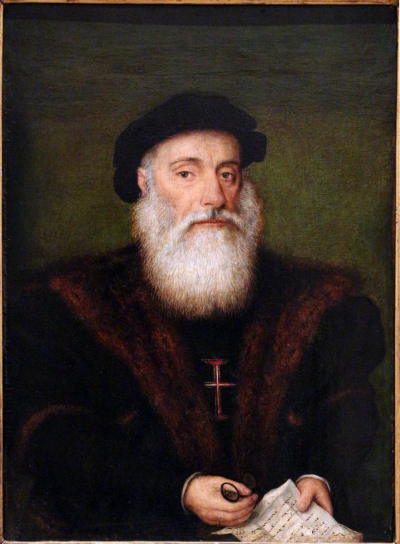The Portuguese discovery of the sea route to India was the first recorded trip directly from Europe to India, via the Cape of Good Hope. Under the command of Portuguese explorer Vasco da Gama, it was undertaken during the reign of King Manuel I in 14951499. Considered one of the most remarkable voyages of the Age of Discovery, it initiated the Portuguese maritime and trade presence in Kerala and the Indian Ocean.
Vasco da Gama, 1st Count of Vidigueira (UK: , US: ; European Portuguese: [ˈvaʃku ðɐ ˈɣɐ̃mɐ]; c. 1460s – 24 December 1524), was a Portuguese explorer and the first European to reach India by sea.His initial voyage to India by way of Cape of Good Hope (1497–1499) was the first to link Europe and Asia by an ocean route, connecting the Atlantic and the Indian oceans and therefore, the West and the Orient. This is widely considered a milestone in world history, as it marked the beginning of a sea-based phase of global multiculturalism. Da Gama's discovery of the sea route to India opened the way for an age of global imperialism and enabled the Portuguese to establish a long-lasting colonial empire along the way from Africa to Asia. The violence and hostage taking employed by da Gama and those who followed also assigned a brutal reputation to the Portuguese among India's indigenous kingdoms that would set the pattern for western colonialism in the Age of Exploration. Traveling the ocean route allowed the Portuguese to avoid sailing across the highly disputed Mediterranean and traversing the dangerous Arabian Peninsula. The sum of the distances covered in the outward and return voyages made this expedition the longest ocean voyage ever made until then.After decades of sailors trying to reach the Indies, with thousands of lives and dozens of vessels lost in shipwrecks and attacks, da Gama landed in Calicut on 20 May 1498. Unopposed access to the Indian spice routes boosted the economy of the Portuguese Empire, which was previously based along northern and coastal West Africa. The main spices at first obtained from Southeast Asia were pepper and cinnamon, but soon included other products, all new to Europe. Portugal maintained a commercial monopoly of these commodities for several decades. It was not until a century later that other European powers, first the Dutch Republic and England, later France and Denmark, were able to challenge Portugal's monopoly and naval supremacy in the Cape Route.
Da Gama led two of the Portuguese India Armadas, the first and the fourth. The latter was the largest and departed for India four years after his return from the first one. For his contributions, in 1524 da Gama was appointed Governor of India, with the title of Viceroy, and was ennobled as Count of Vidigueira in 1519. He remains a leading figure in the history of exploration, and homages worldwide have celebrated his explorations and accomplishments. The Portuguese national epic poem, Os Lusíadas, was written in his honour by Luís de Camões. In March 2016 thousands of artifacts and nautical remains were recovered from the wreck of the ship Esmeralda, one of da Gama's armada, found off the coast of Oman.

1498May, 20
Portuguese explorer Vasco da Gama discovers the sea route to India when he arrives at Kozhikode (previously known as Calicut), India.
Choose Another Date
Events on 1498
- 20May
Discovery of the sea route to India
Portuguese explorer Vasco da Gama discovers the sea route to India when he arrives at Kozhikode (previously known as Calicut), India. - 31Jul
Trinidad
On his third voyage to the Western Hemisphere, Christopher Columbus becomes the first European to discover the island of Trinidad. - 26Aug
Pietà (Michelangelo)
Michelangelo is commissioned to carve the Pietà.

 English
English  español
español  français
français  português
português  русский
русский  العربية
العربية  简体中文
简体中文 